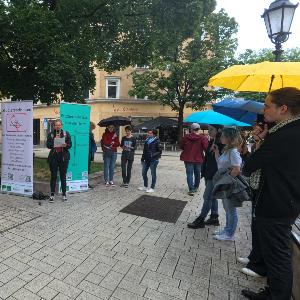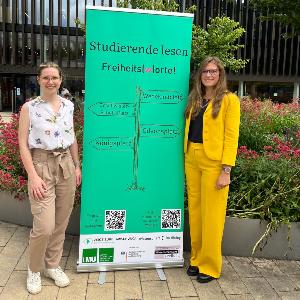The (un)freedoms of Munich: Literature on location
7 Aug 2024
A German studies project highlights the reprisals experienced by 20th-century authors – and places their texts within Munich’s cityscape.
7 Aug 2024
A German studies project highlights the reprisals experienced by 20th-century authors – and places their texts within Munich’s cityscape.

During city walks, participants of the seminar Freiheits(w)orte read works on the subject of freedom to interested passers-by | © Anna Axtner-Borsutzky, Rebecca Thoss
Censored, banned and burned: Writers have always suffered restrictions on their freedom, and have made lack of freedom itself a topic of their work. Some penned their works behind bars. Others had to watch as their books were given over to the flames. The multi-layered project Freiheits(w)orte (Words and Places of Freedom) situates literature in the history and locality of the City of Munich. And yet again, it shows how keenly relevant literary scholarship can be.
“Scientific communication is important,” says Konstantin Schiller, “not just in STEM subjects, but in the study of German as well.” The trainee teacher has just read aloud a poem by Joachim Ringelnatz on the Geschwister-Scholl-Platz. Ringelnatz, house poet at the Simplicissimus artists’ bar, lived in such dire poverty that he sent a “Prayer of Anguish in a Housing Crisis” to the heavens above Munich.
Schiller and a group of students from the interactive project seminar Freiheits(w)orte, run by Germanists Dr. Anna Axtner-Borsutzky and Rebecca Thoss, are now walking up the Ludwigstraße. On this rainy day in June, they have already – armed with roll-ups, a portable sound system and a palpable enjoyment when reading aloud a wide variety of texts – been to the Wedekindplatz, symbol of Schwabing’s bohemian lifestyle.
The seminar participants had also read works for a handful of inquisitive and interested passers-by in front of the Feldherrnhalle. Why? To convey a deeper appreciation of literature – and to showcase how relevant literature and literary scholarship are to society. Because the carefully selected texts and biographies genuinely addressed serious issues: nothing less than the question of what freedom is, what threatens it – and how one can write and live in “unfreedom”.
Seventy-five years after West Germany’s Basic Law was ratified and 35 years after the fall of the Wall, this debate appears more topical than ever. The war in Europe, the swing to the right in Germany and elsewhere, geopolitical uncertainty: All these developments have muted our appetite for celebration. Which is precisely what makes it all the more important to have initiatives such as the nationwide university competition backed by the Federal Ministry of Education and Research (BMBF) and the organization Wissenschaft im Dialog (Academic Dialogue), both of which issued an invitation to an intellectual debate around the subject of freedom. The Freiheits(w)orte project, launched by the Institute of German Studies at LMU, was one of the twelve winners of the competition.

Rebecca Thoss (left) and Anna Axtner-Borsutzky launched the Freiheits(w)orte project. | © Anna Axtner-Borsutzky, Rebecca Thoss
“Free speech was and is exposed to various restrictions,” Axtner-Borsutzky and Thoss explain. Through their project, they want to send a message to university students, schoolchildren, junior high school students and a wider audience: a message that literature is not crafted in a vacuum, but that it is tied to its context and social developments.
The excesses indulged in by the freedom-loving Schwabing bohème, the political persecution of dissidents, the burning of books: On closer inspection, Munich is literally bursting with literary narratives that speak of freedom and unfreedom. Freiheits(w)orte has picked out a selection of them and placed them in context within the urban landscape.
Among the 20th-century Munich authors whose texts were analyzed in the seminar were writer and occasional prostitute Emmy Hennings, who penned “Ich bin so vielfach in der Nacht” (I am so many different things at night); Ernst Toller, who went to prison for high treason and wrote The Swallow Book after the Munich soviet republic was crushed; and, of course, Erich Kästner, whose books were burned on the city’s Königsplatz.
Using literary analysis techniques to work through texts in a seminar and in historical-literary urban walks was not the only focus of the project, however: At two workshops with schoolchildren from Gilching and Harlaching, the students also debated what freedom is, what threatens it and how Munich authors have tackled these issues.
Senior teacher Emanuel Rüff of the Albert-Einstein-Gymnasiumin Harlaching saw the workshop as a resounding success: “My pupils were delighted and positively surprised. They would never have thought that a university seminar could be so much fun. It was not boring at all.” Rüff was impressed by the whole concept: It was, he said, a “great idea” to get out of the libraries and seminar rooms and into the city’s squares, and so to connect literature with local history.
His colleague Franziska Stelzer of the Christoph-Probst-Gymnasium in Gilching, was likewise full of praise: “The Freiheits(w)orte have once again opened up completely different ways to access literary texts and the city than would ever be possible in the classroom.”
It is astonishing that such a small word as freedom can open up a whole space on both an academic and a personal level.Rebecca Thoss
Trainee teacher Konstantin Schiller also thoroughly enjoyed the workshops with the schoolchildren. He found it exciting to arouse curiosity, and to simply be there with something to offer from the world of literary scholarship, he told us on the way to the Feldherrnhalle[NR1] . Reading is often confined to the realms of private practice, he noted, even though literature and literary studies are all about what and how people think – about “their mentality, their ideology, their experience.”
It goes without saying that the interactive project required a tremendous amount of dedication on the part of the students and leaders: The laid-back strolls through the city were the fruit of meticulous planning. The rights to present the texts in public had to be obtained from writers’ collecting society VG Wort and permission to perform from local government. A special Instagram account was also set up to provide digital support for the project.
Notwithstanding, the two project leaders are in no doubt that it was worth all the effort. “It is astonishing that such a small word as freedom can open up a whole space on both an academic and a personal level,” Rebecca Thoss insists.
The seminar has now come to an end. On 8 November 2024, the Mohr-Villa will host a public reading on the project with author Anne Rabe, whose debut novel “Die Möglichkeit von Glück” (The Possibility of Happiness) concerns itself intensively with the subject of freedom and literature.